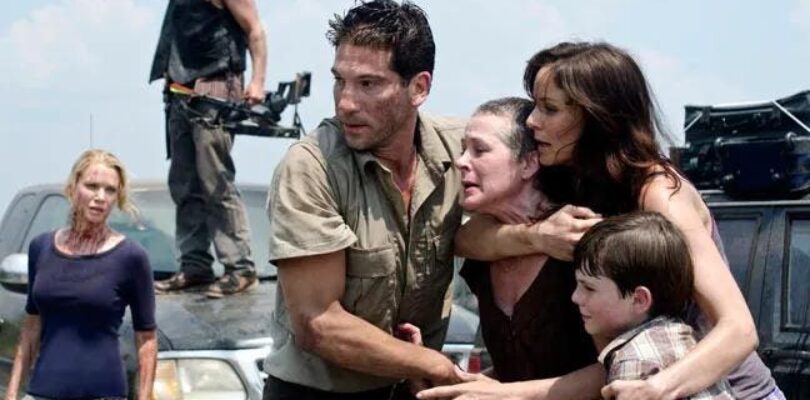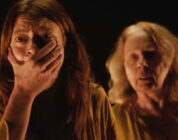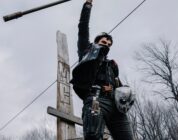In my review of the season premiere of The Walking Dead: The Ones Who Live, I made something clear to readers: I preferred when the show was about a small, ragtag group of survivors trying to make their way through a perilous world. The communities they encountered back then tended to be small. The Governor’s Woodbury was probably the biggest, and it was still early days. The Termites had their whole cannibal operation going, but it was the type of sadistic, desperate community you’d expect to find in such a harsh and unforgiving world.
The best episodes of this show were ones like “Nebraska” when the threat was small but dangerous. Or “Vatos” when the community Rick’s group encountered had surprising depth, and felt like something you might actually encounter in the early days of a zombie apocalypse.
But as soon as Rick and team reached Alexandria, everything changed. And I don’t just mean that the show itself nosedived in quality, though during the regrettable Savior wars—Seasons 7 and 8—it most certainly did. I mean that the fundamental nature of the show changed. What was once the story of a group always on the move became the story of a group trying to settle down. For me, personally, and I think for a lot of other fans, this took the wind out of The Walking Dead’s sails—not so much because they tried to settle down (an understandable effort in a zombie apocalypse), but because they succeeded.
This admission—that I am hard to please because the show insists on focusing on big communities rather than a group on the road—has been met with some backlash online, which is strange because I almost never receive backlash online for my critiques of television shows, but I thought I should elaborate just a touch on this issue since I do think it’s important and something to keep in mind not just with The Ones Who Live, but all the other spinoffs AMC is pumping out for The Walking Dead.
It’s not so much that I’m hard to please merely because of the shift to big communities, it’s because this shift has been handled incredibly poorly and with little foresight. I could a Game Of Thrones style TWD very entertaining. But instead, what we get almost always amounts to something like this:
- Hero Group arrives at Place. Place is run by either Good or Bad people. Through various conflicts, Hero Group causes the downfall of Place, leading to the ruin of the Good or Bad people living there. Hero Group either moves on or builds up Place.
- New Villain Group arrives at Place. Hero Group must fight off Villain Group. Hero Group wins. Hero Group either moves on or builds up Place. If they move on . . . (if Hero Group stays skip next step . . . ).
- Some members of Hero Group go to new Place run by either Good or Bad people. Through various conflicts, Hero Group causes the downfall of Place, leading to the ruin of the Good or Bad people living there.
- New Villain Group arrives at Place . . .
And so on, and so forth, and so on, and so forth. There are not really complicated or interesting political dynamics at play during these conflicts. Gregory getting Rick to assassinate the Saviors was about as close to that kind of thing as we ever saw and all it led to was a dragged out war with Negan, fundamentally black and white / good vs evil in nature.
From there, we got yet another dragged out war with the Whisperers, black and white in nature, good vs evil, with only the slightest deviations from the trend (the best part being Negan’s double-cross of Alpha). Neither of these groups represent morally complex societies. The dragged out conflict with the Commonwealth had a bit of very ham-fisted politicking going on, though it never fleshed it out in any kind of coherent way. Mostly it was just a repeat of all the conflicts that came before, only now with ice cream and freshly pressed linens. Now the CRM and its high-tech society will up the ante, but will it offer anything truly new in terms of narrative? I expect we will get much the same thing, just like we have with the bad French group in Daryl Dixon or the Croat’s people in Dead City. Meet the new villain, same as the old villain. Good luck staying awake.
What’s peculiar to me about all of this is that it’s so linear. In a story like Game of Thrones, we know that all of these various powerful cohorts exist at the same time. Here we have the Lannisters, here the Starks, here the Targaryens, over there the Free Cities and Slaver’s Bay. In The Walking Dead, our group just sort of meanders its way into one group at a time, dispenses with said group, then moves on. There’s no sense of a broader world at play.
Sure, Rick says in one of his dreary, endless narrations in this first episode that the world is “so much bigger and so much smaller” (yeah, Gimple-speak) but this isn’t something we’ve really been shown throughout the course of the entire show’s run. Even glancing over at spinoffs like Fear, it’s just a series of totally detached villain communities like the Vultures or the Isle Of The Bird People or whatever. That’s not how you tell a sprawling, connected story. The CRM has been teased for ages now—and yes, of all the shows, it’s World Beyond that probably did the most to add some connective tissue—but it feels more like the final level in some linear video game than part of a living, breathing world.
And that’s the thing: Either have a great zombie survival story about characters on the road trying to survive, or create an interesting post-apocalyptic world with various power centers that are, in some way, connected and in conflict with one another. Not just this isolated war between the Saviors and the Kingdom/Hilltop/Alexandria, because if there’s this big Commonwealth nearby and an even bigger CRM not so far away, why do we never see them at all until several seasons later? This bizarre linearity makes the whole thing feel inauthentic, and cheapens the world-building.
Chock it up to not planning ahead, I suppose, but at this point we have not only the aforementioned communities, but also New Babylon with its marshals and almost certainly some other communities I’m forgetting, not to mention whichever other community AMC wants to pull, rabbit-like, from its magic hat; and you’d think at some point all of these communities would have be vying over resources, sending envoys, or just talking about each other.
Why is New Babylon looking for Negan with old-timey wanted posters, but the CRM is totally uninvolved? What is the relationship between New Babylon and the Commonwealth/Alexandria in the first place, given Negan was involved with both those communities to begin with? And how does this all map out? In Fear the location of Bird People Island was this big secret, apparently, and they were supposed to be this Very Big Deal but in the end it’s just a few speed boats and some kids. I don’t understand the scope of any of it, or the geography. It’s as if no care whatsoever has gone into actually mapping out the geographical or political terrain of this Extended Walking Dead Universe. And when you don’t plan ahead a little bit you get the ending of Lost or the Star Wars sequel trilogy or global climate change. Whatever the case, it badly hurts the show for those of us who want a little continuity and coherency and just plausibility from time to time. This helps create stakes and tension. And that’s not to say there can’t be surprises or new encounters also, but at some point it all has to make sense.
I know, people will say “It’s just a zombie show” (and I should not review it if I don’t like it and all the other claptrap). Well, I suppose I keep hoping that the premiere zombie show, and one that keeps pumping out new content year after year, would take the time and put in the work to be something better. And if taking on that task is too much, go back to your roots and give us the nomadic zombie survival show that we used to have, back when this was a cultural phenomenon and not just some sad, shambling version of itself.
Of course, I just wrote a whole thing on the follies of hope, so maybe I’ve just gone mad. Maybe we’re all mad here, those of us still stumbling about at the tea party. Then again, when I asked Alice she said: “I’m afraid so. You’re entirely bonkers. But I’ll tell you a secret. All the best people are.”
Here’s my video review of the series premiere of The Ones Who Live:
P.S. There are, of course, myriad other problems with this franchise including the lack of any sort of script quality control, a general lack of quality control in general and so forth, but I wanted to focus more on this particular problem for this particular post.





